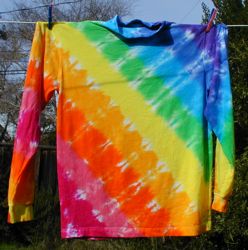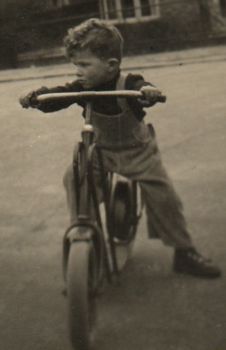| Words, Vocabulary - Spelling and Pronunciation |
|---|
| Shorts - Verbs - Word Order - Exercises - 2 - MX |
|---|
| Lessons - Programs - Read and Listen to Dutch |
|---|
| Find Dutch words: Dutch List - English to Dutch |
|---|
| or: | my site |
![[Marco at Microphone]](artwork6/MarcoMicrofoonH150RT.jpg) |
| Hear Dutch Here
— Learn Dutch
There's never been a better time |
Guide to
the Website
Full Site Map - Mobile |
|---|
|
|
| Facebook page |
| Listen | |
Colors | |
Adjectives and Adverbs | |
Numbers 20-100 (2) | |
The Catholic Minority in Holland |
|---|
![[Black-and-White picture; swan]](lessonspix/zwaanBW225.jpg) zwart-wit foto |

>> clothing |
![[a colorful tie-dye T-shirt]](artwork6/TieDyeSummer330.jpg)
|
| |
|
|
|
|
|
| rood |
oranje |
geel |
groen |
blauw |
paars |
| |
|
|
|
|
|
| zwart |
wit |
bruin |
grijs |
roze* |
* 'Roze'
![]() is a word from French that has an irregular O pronunciation.
is a word from French that has an irregular O pronunciation.
|
(De) kleur
kleurloos kleurrijk lichtblauw donkerblauw In Dutch, 'white' people are called blanken flets pasteltinten (de) schutkleur pikzwart hagelwit sneeuwwit spierwit vuurrood |
scharlaken
violet cyaan mauve vaalbruin pimpelpaars purper rossig groenig gelig ultraviolet infrarood |
| beige
actual color shown is the slightly darker 'ecru' |
![[a rainbow]](artwork5/HennyRegenboogW300.jpg) |
|
![[red-purple flower]](artwork6/paarsebloem300_7.jpg) roodpaars |
![[blue-purple flower]](artwork6/paarsebloem300_6.jpg) blauwpaars |
Colors as nouns are 'het-words'
't Blauw van de hemel
![]() 2
The blue of the sky
't Blauw van spijkerstof is indigo
2
The blue of the sky
't Blauw van spijkerstof is indigo
![]() 2
The blue of denim is indigo
't Groen van planten is chlorofyl
2
The blue of denim is indigo
't Groen van planten is chlorofyl
![]() 2
3
The green of plants is chlorophyll
2
3
The green of plants is chlorophyll
| Materials | |
Irregularities and Exceptions | |
Colors Conjugated |
|---|
![[orange oranges]](ducolors/oranjesinaasappels.jpg)
|
![[pink skin]](ducolors/rozehuid.jpg) |
Adjectives describe or modify nouns: The big man.
Adverbs describe or modify verbs: He spoke loudly.
(het) bijvoeglijk naamwoord
|
de huid is roze - de roze huid
![]()
the skin is pink - the pink skin
![[blue sky]](ducolors/hemel.jpg) |
![[one green apple]](ducolors/groeneappel.jpg) |
Adjectives almost always get an ‑E ending. Not in the first two examples above left, because there the root words already ended in ‑E (oranje, roze.) |
de lucht is blauw - de blauwe lucht
![]() - 2
- 2
the sky is blue - the blue sky
de appel is groen - de groene appel
![]() - 2
- 2
the apple is green - the green apple
![[red tomatoes]](ducolors/rodetomaten.jpg) |
![[a glass of milk, milk is white]](ducolors/melkwit.jpg) |
The pronunciation of the vowel in adjectives rarely changes, but
adding an ‑E
may change the spelling of the word:
groen / groene Read more about Dutch spelling below. |
melk is wit - de witte melk
![]()
milk is white - the white milk
In previous lessons, 'open' and 'closed' syllables were
explained.
When Dutch words divide in syllables:
So, adding an ‑E (or ‑E N, ‑E R etc.) ending to a word that ended in a vowel followed by a single consonant would change the last syllable of the original word from 'closed' to 'open.' The vowel sound rarely changes, so the spelling of the word will change:
| kort
|
lang
|
![[Map Showing the size of Brazil and Holland]](lessonspix/Brazilie50_2.jpg)
See World Map |
de lange les
|
Dutch adverbs are the basic form of the word as you find it in the
dictionary, there is not something like the -LY ending in English.
Adjectives almost always have an ‑E
ending, only after 'een,'
'geen' or no article adjectives for singular 'het' words
don't get an ‑E
ending:
de appel is groen - de groene appel - een groene appel
- het groene appeltje
- een groen
appeltje
![]()
The apple is green - the green apple - a green apple
- the little green apple - a little green apple
De lange man - een lange man - het lange boek
- een lang boek
- de baby slaapt lang
![]()
the tall man - a tall man - the long book - a long book - the
baby sleeps long ('through')
droog brood
![[A sign saying 'Klein Park']](artwork2/kleinparkW200.jpg) (een) klein park |
de ijzeren ketting - de ketting is van ijzer
![]()
(the iron chain - the chain is of iron)
![[grey hair]](ducolors/grijshaar2.jpg) |
S to Z, F to VA few words that end in -S change that S to Z when an ‑E ending is added, for instance:grijs / grijze het haar is grijs - het grijze haar the hair is grey - the grey hair
I hear a sound change like that in English 'house / houses,' but there is
no spelling change in English.
|
![[a glass cup]](ducolors/glazenkopje.jpg)
|
![[a glass plate]](ducolors/glazenbord.jpg)
|
Vowel ChangeA few words get a vowel change when an ‑E ending is added. It is unusual.glas / glazen
het glazen kopje - het kopje is van glas
het glazen bord - het bord is van glas
|
More Colors & Materials - More about Adjectives
| |
|
|
|
|
|
| rood / rode |
oranje |
geel / gele |
groen / groene |
blauw / blauwe |
paars / paarse |
|
|
|
|
|
* | |
| wit / witte |
zwart / zwarte |
bruin / bruine |
grijs / grijze |
roze
(Fr.) |
beige
(Fr.) |
| 20 twintig |
21 éénentwintig |
22 tweeëntwintig |
33 drieëndertig |
44 vierenveertig |
55 vijfenvijftig |
| 66 zesenzestig |
77 zevenenzeventig |
88 achtentachtig |
99 negenennegentig |

step |
The Catholic Minority in HollandI have been told that when I was four or five, I went door-to-door in our street to ask the neighbors if they were Catholics, and if not I told them that I could not come and play anymore. I guess the nuns in my kindergarten had talked about it; but maybe I took it too seriously, for I cannot imagine my brother or sisters doing such a thing.It's a another example of the former compartmentalization (verzuiling My little story was in the 1950s. With few people in Holland attending church anymore, the divides between the traditional religious communities largely disappeared in the 1960s and '70s. I can't imagine modern Dutchmen telling their children not to make friends with children from the other traditional groups.
The Dutch war of liberation from Catholic Spanish rule (1568-1648)
was in part over religious freedom for Protestants;
but under Protestant rule in
the new country the Dutch Catholics became second-rate citizens.
The mainly Catholic Southern provinces became a kind of
territories, governed from Holland, and like in England, Catholics
could not hold government positions or be part of the government
bureaucracy.
|
| Home
(Learning Dutch) |
previous vorige |
|
1 | 2 | 3 | 4 | 5 | 6 | 7 | 8 | 9 | 10 | 11 | 12 | 13 | 14 | 15 |
|
next volgende |